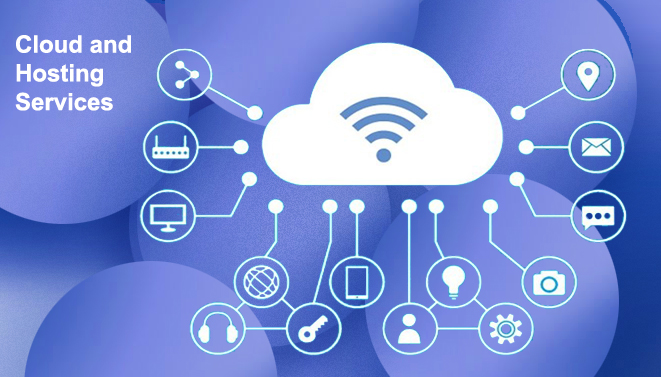Navigating the Future: A Comprehensive Guide to Cloud and Hosting Services
In today’s digital era, businesses and individuals alike are increasingly relying on cloud and hosting services to manage, store, and safeguard their valuable data. From small startups to large enterprises, understanding these services is crucial for leveraging their full potential. This comprehensive guide delves into the essentials of cloud and hosting services, helping you make informed decisions to enhance your digital infrastructure.
Understanding Cloud Services
Cloud services have revolutionized how data is stored, managed, and accessed. They offer a scalable and flexible solution compared to traditional on-premises systems. At its core, cloud computing involves delivering computing services over the internet, allowing users to access resources like servers, storage, and applications on-demand.
Types of Cloud Services
- Infrastructure as a Service (IaaS): IaaS provides virtualized computing resources over the internet. This includes virtual machines, storage, and networks. It’s ideal for businesses that need to scale their infrastructure without investing in physical hardware.
- Platform as a Service (PaaS): PaaS offers a platform allowing customers to develop, run, and manage applications without dealing with the underlying infrastructure. This is particularly useful for developers who want to focus on building software rather than managing servers.
- Software as a Service (SaaS): SaaS delivers software applications over the internet on a subscription basis. Popular examples include Google Workspace, Microsoft 365, and Salesforce. SaaS eliminates the need for local installations and maintenance.
Benefits of Cloud Services
- Scalability: Cloud services offer unparalleled scalability, allowing businesses to adjust their resources based on demand. This flexibility helps manage costs effectively.
- Cost-Efficiency: With a pay-as-you-go model, businesses only pay for the resources they use. This reduces capital expenditure on hardware and software.
- Accessibility: Cloud services enable access to data and applications from anywhere with an internet connection. This enhances productivity and collaboration.
- Disaster Recovery: Cloud providers often offer robust backup and disaster recovery options, ensuring that data is protected and recoverable in case of an emergency.
Exploring Hosting Services
Hosting services are essential for making websites and applications accessible on the internet. They involve storing data and making it available to users through web servers. There are several types of hosting services, each catering to different needs and requirements.
Types of Hosting Services
- Shared Hosting: In shared hosting, multiple websites share the same server resources. This is a cost-effective solution suitable for small websites with moderate traffic.
- Virtual Private Server (VPS) Hosting: VPS hosting offers a dedicated portion of a server’s resources, providing more control and flexibility compared to shared hosting. It’s ideal for growing websites that need more power.
- Dedicated Hosting: With dedicated hosting, an entire server is allocated to a single website or application. This provides high performance, security, and control but comes at a higher cost.
- Cloud Hosting: Cloud hosting uses a network of virtual servers to host websites and applications. It offers scalability and redundancy, making it a popular choice for businesses with fluctuating needs.
- Managed WordPress Hosting: Specifically designed for WordPress websites, managed hosting offers optimized performance and security tailored to the WordPress platform.
Benefits of Hosting Services
- Performance: Hosting services ensure that websites and applications perform optimally, providing fast load times and reliable uptime.
- Security: Many hosting providers offer advanced security features, including firewalls, malware scanning, and SSL certificates, to protect against threats.
- Support: Professional hosting services come with technical support, helping resolve issues quickly and efficiently.
- Customization: Depending on the type of hosting, users can customize their server settings to meet specific needs, such as installing custom software or configuring security protocols.
Cloud vs. Hosting: What’s the Difference?
While cloud and hosting services often overlap, they serve distinct purposes. Cloud services focus on delivering computing resources over the internet, enabling scalable and flexible solutions for data management. Hosting services, on the other hand, are specifically concerned with making websites and applications accessible on the web.
Key Differences:
- Resource Management: Cloud services provide virtualized resources that can be scaled up or down based on demand, whereas traditional hosting typically involves fixed resources allocated to a single server.
- Flexibility: Cloud services offer more flexibility and scalability compared to traditional hosting, which can be more rigid and limited in capacity.
- Cost Structure: Cloud services generally operate on a pay-as-you-go model, while hosting services may involve fixed monthly or annual fees.
Choosing the Right Solution for Your Needs
Selecting between cloud and hosting services depends on your specific requirements and objectives. Consider the following factors:
- Scale and Growth: If you anticipate rapid growth or fluctuating demand, cloud services offer the flexibility to scale resources as needed. For more stable requirements, traditional hosting might suffice.
- Budget: Evaluate the cost implications of each option. Cloud services might have variable costs based on usage, while hosting services often involve predictable pricing.
- Technical Expertise: If you need a high degree of control and customization, dedicated or VPS hosting may be preferable. For ease of use and management, cloud services or managed hosting solutions might be more suitable.
Conclusion
Navigating the world of cloud and hosting services can be daunting, but understanding their core principles and benefits is essential for making informed decisions. Cloud services offer a flexible and scalable approach to managing digital resources, while hosting services focus on ensuring your website or application is accessible and performs well.
By carefully assessing your needs, budget, and growth prospects, you can choose the right solution to support your digital infrastructure and drive your business forward. As technology continues to evolve, staying informed about the latest trends and innovations in cloud and hosting services will help you remain competitive and efficient in an increasingly digital world.
